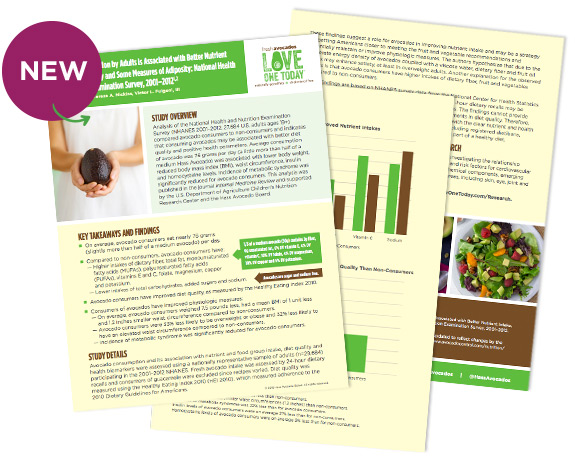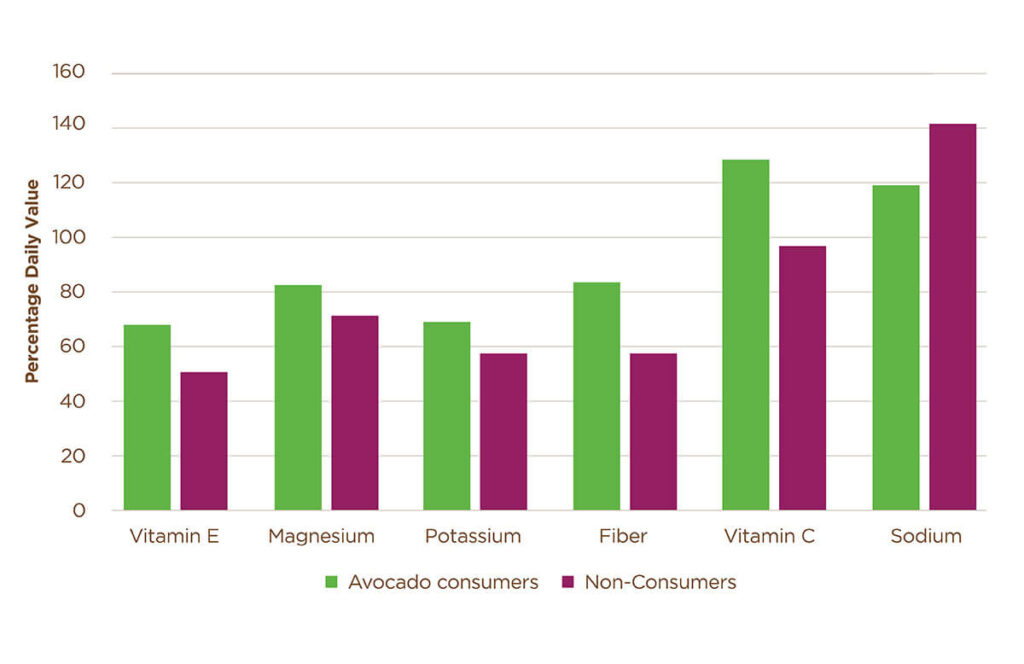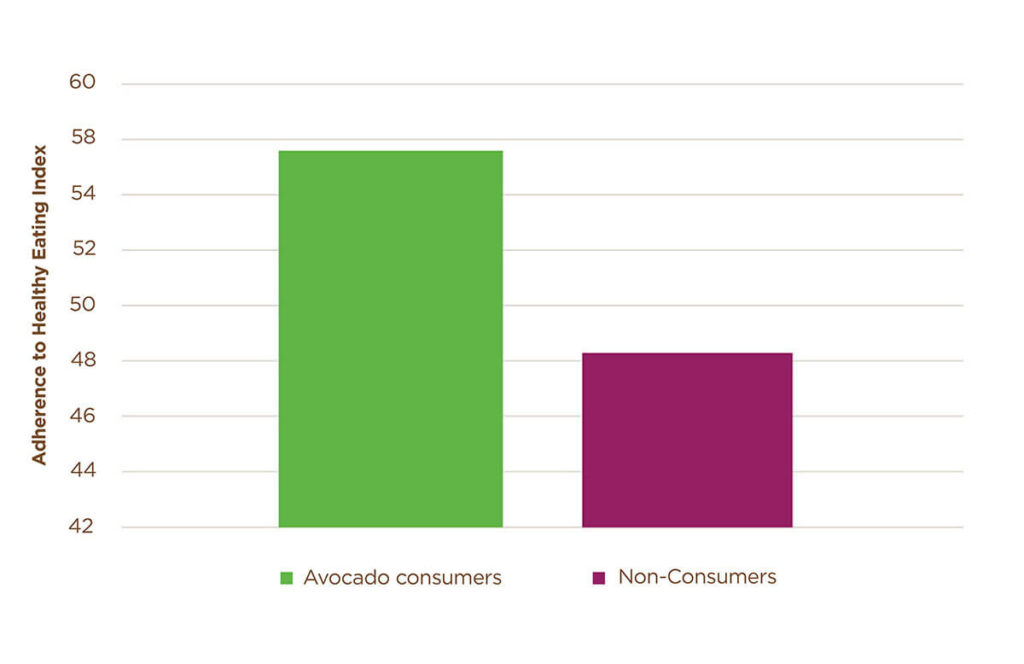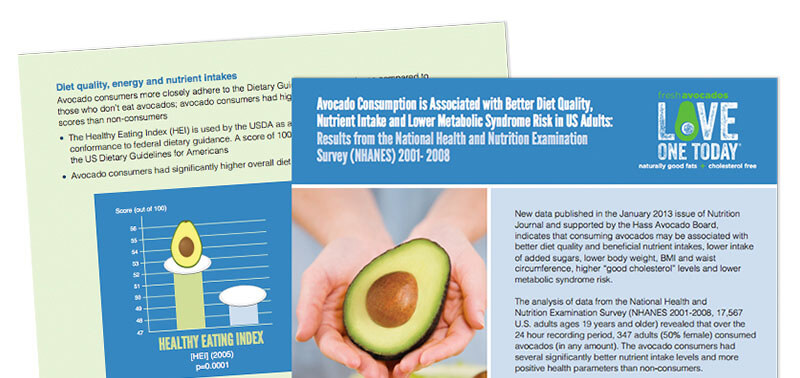Study Overview
Analysis of the National Health and Nutrition Examination Survey (NHANES 2001–2012, 27,684 U.S. adults ages 19+) compared avocado consumers to non-consumers and indicates that consuming avocados may be associated with better diet quality and positive health parameters. Average consumption of avocado was 76 grams per day (a little more than half of a medium Hass Avocado) was associated with lower body weight, reduced body mass index (BMI), waist circumference, insulin and homocysteine levels. Incidence of metabolic syndrome was significantly reduced for avocado consumers. This analysis was published in the journal Internal Medicine Review and supported by the U.S. Department of Agriculture Children’s Nutrition Research Center and the Hass Avocado Board 1.
Published: Internal Medicine Review
Study funded by Hass Avocado Board
Category: Healthy Living at Every Age, Type 2 Diabetes, Weight Management
Scientific Summary PDF
Read the Press Release
See Published Study
Key Takeaways & Findings
On average, avocado consumers eat nearly 76 grams per day (slightly more than half of a medium avocado per day.)
Compared to non-consumers, avocado consumers have higher intakes of dietary fiber, total fat, monounsaturated fatty acids (MUFAs), polyunsaturated fatty acids, (PUFAs), vitamins E and C, folate, magnesium, copper and potassium.
Avocado consumers were 33% less likely to be overweight or obese and 32% less likely to have an elevated waist circumference compared to non-consumers.
Compared to non-consumers, avocado consumers have lower intakes of total carbohydrates, added sugars and sodium.
Insulin levels of avocado consumers were on average 21% less than for non-consumers.
On average, avocado consumers weighed 7.5 pounds less, had a mean BMI of 1 unit less and 1.2 inches smaller waist circumference compared to non-consumers.
Avocado consumers have improved diet quality, as measured by the Healthy Eating Index 2010.
Incidence of metabolic syndrome was significantly reduced for avocado consumers.
Homocysteine levels of avocado consumers were on average 9% less than for non-consumers.

STUDY DETAILS:
Avocado consumption and its association with nutrient and food group intake, diet quality and health biomarkers were assessed using a nationally representative sample of adults (n=29,684) participating in the 2001–2012 NHANES. Fresh avocado intake was assessed by 24-hour dietary recalls and consumers of guacamole were excluded since recipes varied. Diet quality was measured using the Healthy Eating Index 2010 (HEI 2010), which measured adherence to the 2010 Dietary Guidelines for Americans.
- Avocado consumers weighed 7.5 pounds less than non-consumers.
- Avocado consumers had smaller waist circumferences (1.2 inches) than non-consumers.
- Incidence of metabolic syndrome was 32% less than for avocado consumers.
- Insulin levels of avocado consumers were on average 21% less than for non-consumers.
- Homocysteine levels of avocado consumers were on average 9% less than for non-consumers.
CONCLUSION:
These findings suggest a role for avocados in improving nutrient intake and may be a strategy for getting Americans closer to meeting the fruit and vegetable recommendations and potentially maintain or improve physiologic measures. The authors hypothesize that due to the moderate energy density of avocados coupled with a viscose water, dietary fiber and fruit oil matrix may enhance satiety, at least in overweight adults. Another explanation for the observed effects is that avocado consumers have higher intakes of dietary fiber, fruit and vegetables compared to non-consumers.
These findings are based on NHANES survey data from the National Center for Health Statistics of the Centers for Disease Control and Prevention, and the 24-hour dietary recalls may be inaccurate and biased due to misreporting and memory lapses. The findings cannot provide causal evidence between avocado consumption and improvements in diet quality. Therefore, more studies are needed to confirm these findings. However, with the clear nutrient and health benefits associated with consumption, nutrition educators, including registered dietitians, should consider helping all consumers to include avocados as part of a healthy diet.
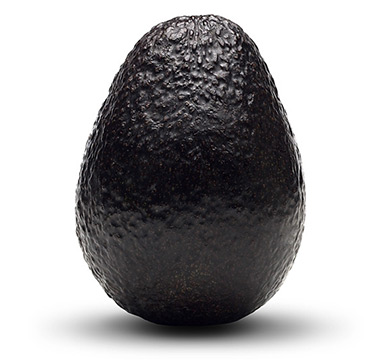
Hass Avocado Board Supports Nutrition Research
The Hass Avocado Board (HAB) is a promotion, research and information organization under supervision of the United States Department of Agriculture. HAB has a science research pipeline of ongoing clinical studies investigating the relationship between fresh avocado consumption and weight management and risk factors for cardiovascular disease and diabetes. And, based on their nutrition and phytochemical components, emerging research suggests that avocados may play benefit many emerging areas, including skin, eye, joint and cellular health.
Reference:
1. O’Neil, C.E., T.A. Nicklas, V.L. Fulgoni. Avocado Consumption by Adults is Associated with Better Nutrient Intake, Diet Quality, and Some Measures of Adiposity: National Health and Nutrition Examination Survey, 2001–2012. Internal Medicine Review 2017.

